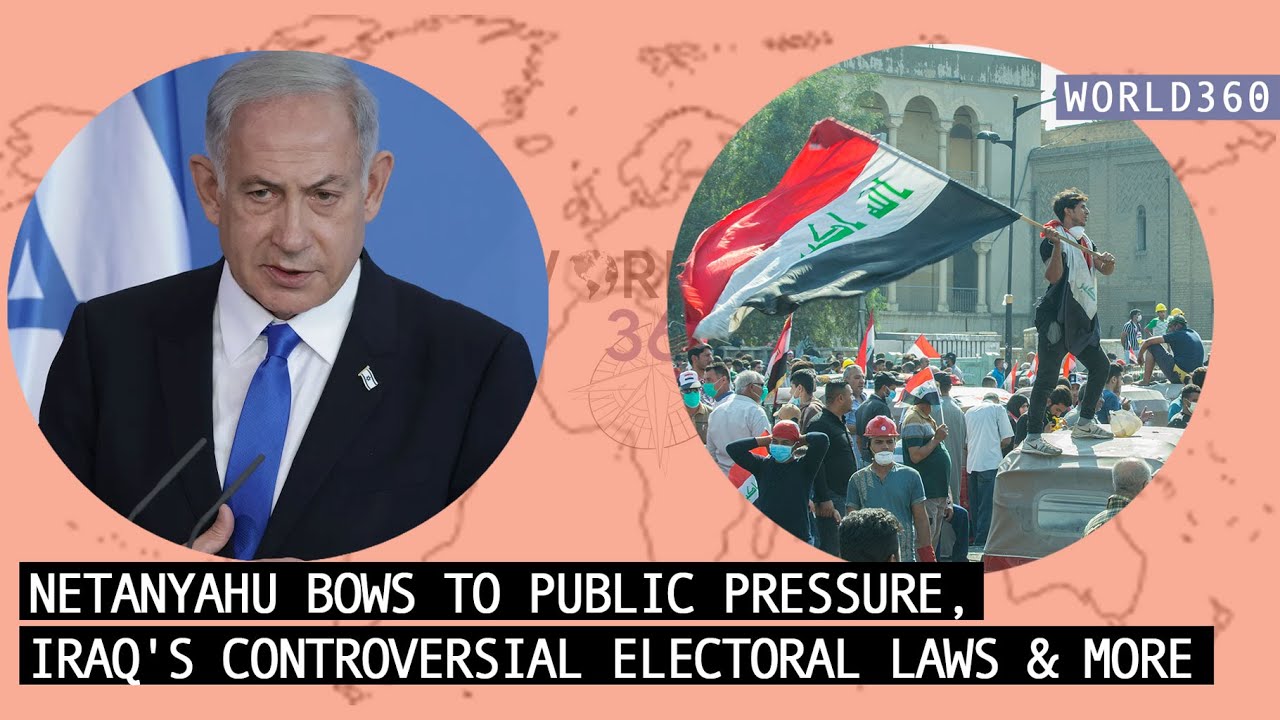Israel Pm Netanyahu Bows To Protests, Why Lebanon Is Now Split Into Two Time Zones & More
Unleash Your Creative Genius with MuseMind: Your AI-Powered Content Creation Copilot. Try now! 🚀
Hello and welcome to a fresh perspective on the world's unfolding stories. We're about to embark on a journey that stretches from the political turmoil in Israel to a surprising twist in Iraq, and finally, we'll unravel the perplexing tale of time zones in Lebanon. Fasten your seatbelts as we take a roller-coaster ride through these intriguing tales.
Israel's Diplomatic Tango
Is Israel's Prime Minister, Benjamin Netanyahu, about to pull off the greatest pivot of his political career? It all began when protests erupted across Israel, a furious reaction to Netanyahu's proposed judicial reforms. These reforms aimed to grant Israel's parliament the power to overrule Supreme Court decisions with a simple majority vote. A significant chunk of the population, approximately half a million Israelis, took to the streets, waving banners and demanding that their voices be heard.
This may just be the most extensive domestic protest movement Israel has ever witnessed. And it seems, against all odds, that the protesters might have succeeded. Netanyahu, facing growing demands for his resignation, chose to put the proposed reforms on hold. The pressure on him escalated, especially after he ousted his defense minister for opposing the changes.
Now, here's where it gets really intriguing. Ultra-nationalists in Netanyahu's coalition government had made it clear that they'd withdraw their support if he didn't push forward with these reforms. So, in pausing these controversial reforms, Netanyahu finds himself between a rock and a hard place.
The repercussions of this political drama ripple across the globe. Israel's largest labor union instructed all government employees to strike, including those connected to diplomatic missions. As a result, Israeli embassies worldwide had to close their doors. This has cast a shadow over Israel's image, particularly in countries like the UK, France, Germany, and the US.
The implications are profound. Some believe that Israel, for the first time, is under the leadership of an "irrational actor," as described by American political commentator Thomas Friedman. And this could spell trouble for the US, as it is Israel's closest ally. An immediate reassessment might be in order for both President Biden and the pro-Israel Jewish Lobby in America.
Iraq's Electoral Reversal
Shifting our focus to Iraq, where the winds of change have taken an unexpected turn. Iraq's Parliament, largely influenced by powerful pro-Iran Shiite factions, recently voted to restore electoral laws that were discarded after the 2019 anti-government protests. These changes have raised eyebrows, as they seem to undo one of the major gains from those mass demonstrations.
The new law replaces the previous 83 electoral districts with 18 seats, one for each of Iraq's provinces. This shift is seen as potentially advantageous to top politicians who are already in power, making it easier for them to retain their seats. The new law also ditches the "first-past-the-post" electoral system used in India, opting instead for proportional representation.
While these changes may seem detrimental to independent candidates, some argue that they are necessary in a country like Iraq, where government formation can drag on for an excruciatingly long time. It's worth noting that it took a record 382 days to form the most recent Iraqi government after the 2021 parliamentary elections.
The political landscape in Iraq is complex, and these changes could be seen as an attempt to simplify it. However, this transition from multi-member constituencies to provincial-based ones could also further entrench the dominance of top political parties.
Lebanon's Time Warp
Now, let's step back and move westward to Lebanon, where time itself has become a matter of controversy. A snap decision by the government recently introduced daylight savings. This, as you might be aware, is the practice of adjusting clocks to extend daylight hours during warmer months.
However, the implementation in Lebanon didn't go as smoothly as one would hope. Some businesses and even churches rebelled against this decision, causing confusion and leading to a surreal situation where two time zones emerged within the same country.
While the move aimed to provide relief to Muslims during the fasting month of Ramadan, it faced opposition from the Maronite Church, a significant Catholic presence in the region. Lebanon, already grappling with its worst economic and financial crisis, is caught in a whirlwind of uncertainty.
The chaos resulting from this daylight savings policy left people with different work and school schedules, effectively dividing the nation into two time zones.
These three geopolitical stories are indeed as captivating as they are surprising. They serve as a reminder that our world is constantly in motion, with unexpected twists and turns at every corner. As we wrap up, let's not forget the importance of high-quality, fair, and questioning journalism. It's the cornerstone of understanding our ever-changing world.
To support the in-depth journalism we provide, we invite you to consider a paid subscription to our platform. You'll gain access to exclusive benefits, such as priority passes to webinars and on-ground events, the opportunity to get your articles published, specially curated newsletters, and much more. Your support allows us to continue uncovering the stories that matter.
Thank you for joining us on this enlightening journey. This is for The Print, where we believe in journalism without hyphens, where the focus is on quality, fairness, and always questioning.

Related Recaps
- How The Civil War Almost Became A World War (And What If It Did?) | Alternate History
- Me Cissé répond à Yérim Seck"un pré-rapport c'est un rapport, ils veulent rendre inéligible Sonko
- 💍😍 ¡5 trucos infalibles para CONQUISTAR a una mujer CASADA!
- WE HAVE A BRAND NEW IMAGE FOR THE OWL HOUSE FINALE!
- Lý Do Không Một Quốc Gia Nào Có Thể Nắm Trong Tay “Chim Ăn Thịt” F-22 Của Mỹ